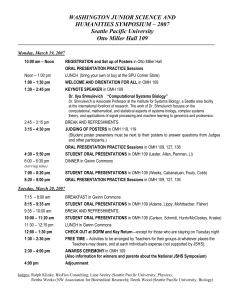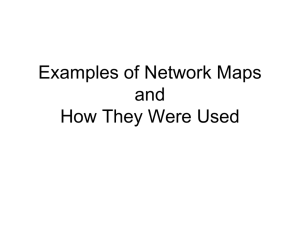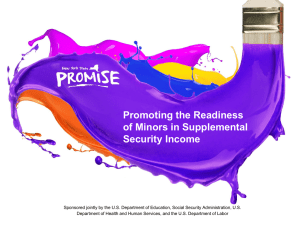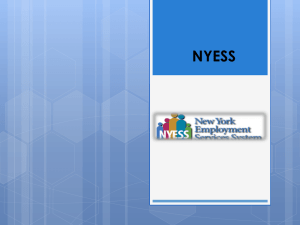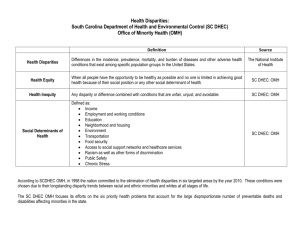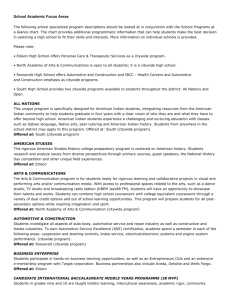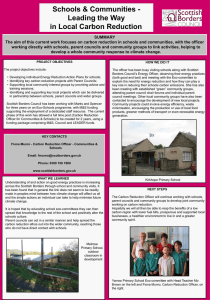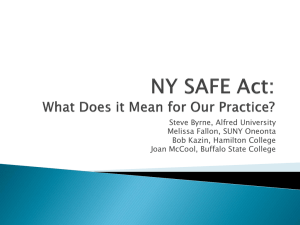Our Vision and Mission - the citywide mental health project
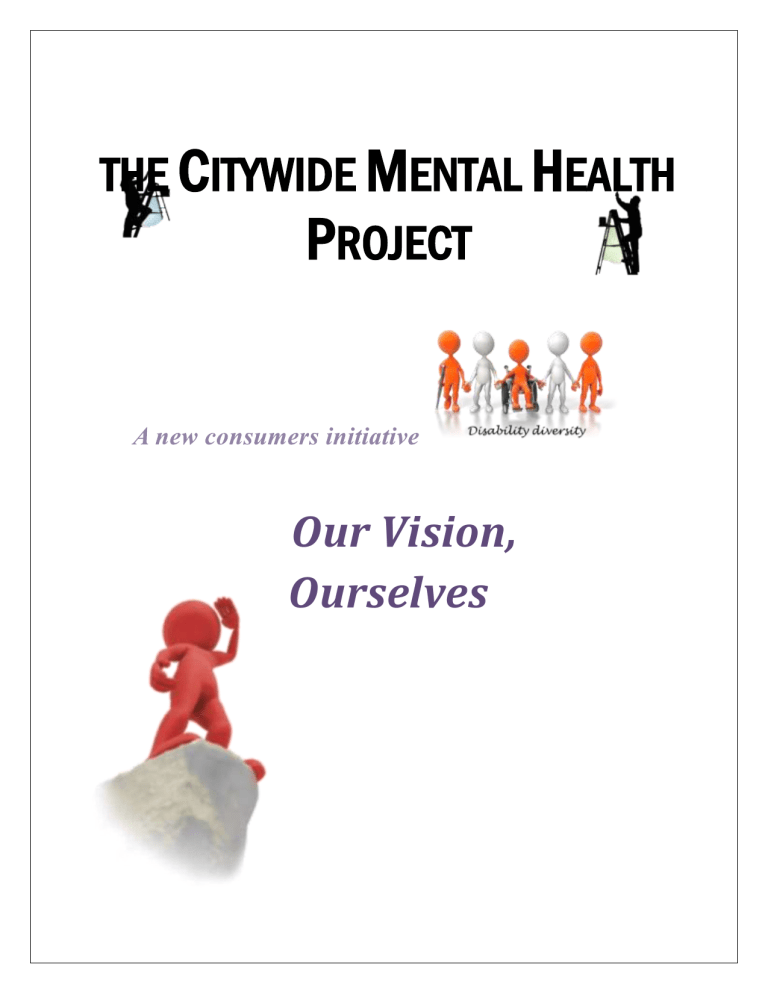
THE
C
ITYWIDE
M
ENTAL
H
EALTH
P
ROJECT
Our Vision,
Ourselves
Introduction
In a mental health system described by the
NYS Medicaid Redesign Team as “fragmented”,
not only the State loses money: We suffer in our bodies and minds its corrosive consequences.
The Citywide Mental Health Project is a project in the making. Our group is composed of consumers and our supporters - friends and relatives. At the time of this paper, our group is less than a year old. We are striving to raise awareness about the lack of voice of consumers in the provision of our own health care and about the pressing need for us to take the public mental health system in our hands and help shape it into a system that actually responds to our needs with respect and dignity.
Here we present our view of the problems we confront within our state’s public mental health system and our approach to securing a voice in its policy decision-making process: The creation of Consumers Advisory Boards (CABs) in each program to collect the consumers’ recommendations and concerns about the quality of the services we receive.
We acknowledge that most providers are well intentioned, professional and supportive of their consumers. Still, we need to face the reality of a system that is “fragmented” at its best and abusive at its worse.
The Citywide Mental Health Project
November 2012
Statement of the Problem
T he many problems that we, people with mental and physical disabilities, experience when trying to access mental health services are rooted in one underlying problem, namely:
That we have neither voice nor meaningful participation at any level of the state’s public mental health policy decision-making process, despite the opportunities for participation mandated by federal and state laws.
Figure 1
We are outside the system.
The myth of consumer participation:
Figure 2
Example of mental health policy.
The NYS Office of Mental Health (OMH) and the NYC
Department of Health and Mental Health (DOHMH) claim, regarding consumer participation in our mental health system, that:
Consumers have “ great input”, that this is
“person-oriented” system,
That Consumer Advisory Boards (CABs) gives us a voice within the programs we use, and
That consumer’s advisory council allows us to advise the commissioners of both agencies about our needs in the mental health system.
But, is all this really the way things are out there?
Mind you, all of these ‘tools’ for us to give “input” about the efficiency of our public mental health system are a federal mandate, the result of years of
consumers struggling to stop the abuses received at the hands of states and some
for-profit and not-for-profit providers .
Contrary to expectations, those old forms of abuses persist in the new millennium
.
Figure 3
New York Times series on abuse, 2011. This led to the re-organization of NYS ’ OMH.
We don’t have to settle for mediocrity and abuse in order to have housing or mental health services. For many of us, our lives ought to start again once we get housing. We are not children; we still have humanity, dignity and a desire to be active citizens in this society.
The reality:
As much as our peers within those city and state-level councils may try to make the system work better for us, the truth is that these “consumers councils” have
NO IMPACT on our daily struggle within those community programs where we receive services. For example:
1. Perennial Problems Experienced by People with Mental Illness/Disability:
Abuse - physical/emotional/stereotyping/indifference.
No meaningful grievance procedures in our programs.
No meaningful legal protection.
To resolve our grievances, we are often forced to go outside the mental
health system and seek help from politicians or public legal aid. In courts, where OMH and the city are frequently defendants together with abusive providers, we usually lose our cases.
There is hardly any CAB in any of the community programs we attend, including supportive housing programs.
2. OMH’s and DOH’s advisory councils:
The purpose of these councils is for consumers to “advise” our policy makers about the issues important to us. A “fragmented” system is evidence that they haven’t been heard. There are no records to show what ‘advice’ the consumers (not the city’ staff) in the Federation have provided to the city’s commissioner of the DOH.
3. The progress in the mental health system does not reflect progress in
those problems mentioned above. The evidence:
The lack of oversight over providers and the inability of OMH to protect us explains in part why, in 2012, we find our governor pressured by public outraged over continued abuses to dismantle the OMH’s offices for ‘quality of care and advocacy” and create a Center for the Protection of People with
Special Needs. It is still to be seen whether this “center” will prevent those abuses.
The most important evidence: consumers are not allowed to talk about
abuses at any level within the public mental health system.
4. The big secret: The mental health system is still doing harm to us:
Increased depression after interactions with the system/professionals.
Violent behavior/self-harm after interactions with our system and professionals.
‘Learned helplessness’ as a result of our failure to impact the system; the system denies us a voice in it and keeps us dependent on it.
Our approach to change
Figure 4
Taking the plunge.
We can’t afford any longer to wait for these “councils” to start “advising” the commissioners about our real problems within these programs. The looming nation’s financial crisis will be an excuse to cut services and further reduce the quality of the remaining services. We need to have a voice within these programs now.
Thus, we, as consumers, have decided to do that which neither OMH nor DOH are doing as mandated to them:
1) We will help our peers organize CABs in their programs. We will team up with those providers confident enough in their
Figure 5
Consumers and providers. professionalism to listen to our feedback without fears, and
2) We will train ourselves and our peers to evaluate the quality, effectiveness and accessibility of the services in
the programs in which we are receiving them.
This project will save the State money because we will be at the front door preventing waste of tax payer’s money: From contributing to better use of community resources, to preventing abuses that cost millions of dollars in court proceedings.
The direct engagement of consumers in evaluating services is necessary for the efficient functioning of our mental health system.
The invitation:
If you receive supportive housing services or any other public mental health system service and want to participate in this project, contact us. This is for you. Come help develop this project, which is ripe for picking: consumers actually shaping the mental health system from the bottom up to protect themselves.
Email: citywidementalhealthproject@live.com
Lourdes Cintron,
Founder of the Citywide Mental Health Project
(718)561-8415
The CITYWIDE MENTAL HEALTH PROJECT
Our Vision
1.
Consumers of mental health services engaged in our State’s mental health policy decision-making system, redeeming and preserving the promises and achievements inherited from our peers years of community mental health and disability activism.
2.
The Citywide Mental Health Project leading the transformation of the mental health system: a.
From within each of the city’s mental health programs and b.
With the input of engaged consumers and their independent advocacy organizations.
3.
We see ourselves as growing to be a force to be reckoned with.
The Mission
Mobilize, empower and train consumers to:
1) Evaluate the quality, effectiveness and accessibility of services received in our programs.
2) Participate in the policy-making process in the programs where we receive the services.
3) Empower to protect ourselves and each other from abusive practices in the programs where we receive the services.
The Goals
1.
Creating CABs (Consumer Advisory Boards) in the programs where we receive the services around NYC.
2.
These boards will be the heart of each program: a) Consumers will come here for information and communication with
the program’s management teams; b) In the CAB they will receive advocacy, training and empower
themselves in the effective use of their program services and the
mental health system in general. c) Consumers sharing their life experiences to help their providers
and other consumers to access services in the community.
